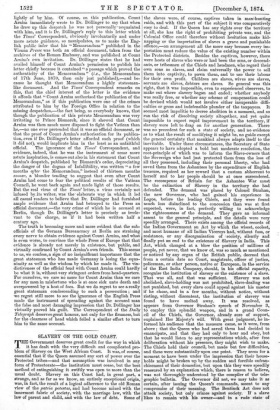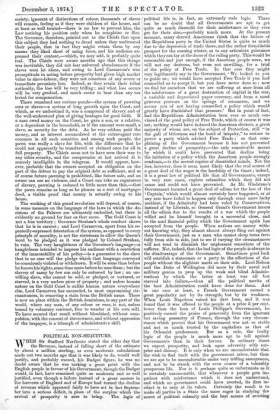SLAVERY ON THE GOLD COAST.
TilGovernment deserves great credit for the way in which t has dealt with the very difficult and complicated pro- blem of Slavery on the West African Coast. It was, of course, essential that if the Queen assumed any sort of power over the Protected tribes—and that assumption was involved in any form of Protectorate—the institution' must cease, but the best method of extinguishing it swiftly was open to more than the usual doubt. Slavery on this Coast had, in great part, a strange, and as far as we know, an entirely exceptional origin, was, in fact, the result of a logical adherence to the old Roman view of the patria potestas, and had become mixed with the innermost fabric of society, with the marriage law, with the law of parent and child, and with the law of debt. Some of the slaves were, of course, captives taken in man-hunting raids, and with this part of the subject it was comparatively easy to deal. If the Queen has any rights over the territory at all, she has the right of prohibiting private war, and the Colonial Office could therefore without hesitation make kid- napping or the importation of slaves a grave and punishable offence,—an arrangement all the more easy because every im- portation must reduce the value of the existing number within the Protected districts. Besides the captives, however, there were hosts of slaves who were or had been the sons, or descend- ants, or tribesmen of the Chiefs and headmen who regard their own sons as slaves, and claim universally the ie power to sell them into captivity, to pawn them, and to use their labour for their own profit. Children are slaves, wives are slaves, servants are slaves, debtors are slaves. So general was this right, that it was impossible, even to experienced observers, to make out where slavery began and ended; whether anybody was really free, or whether any scheme of compensation could be devised which would not involve either insuperable diffi- culties or gross and indefensible plunder of the taxpayers. It seemed most impolitic to decree abolition in a moment, and so run the risk of dissolving society altogether, and yet quite impossible to expect rapid improvement in the territory, if slavery were left to drag on for another generation. There was no precedent for such a state of society, and no evidence as to what the result of modifying it might be, no guide except the general certainty that mankind always adapts itself to the inevitable. Under these circumstances, the Secretary of State appears to have adopted a bold but moderate resolution, the root-principle of which was to inform the Slave-owners that the Sovereign who had just protected them from the loss of all they possessed, including their personal liberty, who had saved them from the Ashantees by the expenditure of English treasure, required as her reward that a custom abhorrent to herself and to her people should be at once surrendered. The recompense of Britain for the Ashantee War must be the extinction of Slavery in the territory she had defended. The demand was placed by Colonel Strahan, the new Governor, who had gained his experience in Lagos, before the leading Chiefs, and they were found much less disinclined to the concession than was at first expected, were, in fact, perfectly willing to acknowledge the righteousness of the demand. They gave an informal assent to the general principle, and the details were very speedily arranged. There exists among the official records of the Indian Government an Act by which the wisest, coolest, and most humane of all Indian Viceroys had, without fuss, or resistance, or any disorganisation of society, silently and finally put an end to the existence of Slavery in India. This Act, which changed at a blow the position of millions of people, yet never, that we know of, was so much as mentioned or noticed by any organ of the British public decreed that from a certain date no Court, magistrate, officer of justice, policeman, or other person, native or European, in the service of the East India Company, should, in his official capacity, recognise the institution of slavery or the existence of a slave. That was all, and that was sufficient. Slavery was not abolished, slave-holding was not prohibited, slave-dealing was not punished, but every slave could appeal against his master if he chose, and in a few months, without notice, without rioting, without discontent, the institution of slavery was found to have melted away. It was resolved, as appears from Governor Strahan's speech of November 3, to employ this splendid weapon, and in a grand Coun- cil of the Chiefs the Governor, already sure of support, explained Her Majesty's will. With great judgment, he in- formed his audience that the measure came, as it were, from above ; that the Queen who had saved them had decided to emancipate, and that they had only to hear and obey, but that he would listen to any representations which, after free deliberation without his presence, they might wish to make. The Chiefs held their council, but made but few difficulties, and these were substantially upon one point. They seem for a moment to have been under the impression that their house- holds rnight be broken up by the sudden and forcible enfran- chisement of their domestics, but upon this they were speedily reassured by an explanation which, there is reason to believe, was not thoroughly understood by the compiler of the tele- graphic bulletin. The Governor did not, we may take it as certain, after issuing the Queen's commands, assent to any compromise of their meaning. The Bentinck Act does not attack society, but only crimes against society. If a slave likes to remain with his owner—and in a rude state of society, ignorant of distinctions of colour, thousands of slaves will remain, feeling as if they were children of the house and at least as well treated—there is no law to prevent him, the Law noticing his position only when he complains or flies. The Governor, therefore pointed out to the Chiefs that upon this subject they had nothing to dread unless they maltreated their people' that in fact they might retain them by any means they Mod short of using force, and his audience ex- pressed their content,—which, we may add, is probably quite real. The Chiefs were aware months ago that this change was inevitable, they did not fear universal abandonment if the slaves were let alone, and owing to Lord Carnarvon's wise promptitude in acting before prosperity had given high market value to slave-labour, they were not conscious of any severe or immediate pecuniary loss. Indeed, as they retain their tribal authority, the loss will be very trifling ; and what loss occurs will be very gradual, and much easier to bear than any tax levied for compensation.
There remained one curious puzzle—the system of pawning sons or slaves—a system of long growth upon the Coast, and which, as we understand it, was a compound of slavery and of the well-understood plan of giving hostages for good faith. If a man owed money on the Coast, he gave a son, or a relative, or a dependent in the household, or if the amount were small, a slave, as security for the debt. As he very seldom paid the money, and as interest accumulated at the extravagant rate common in all such countries and among such people, the pawn was really a slave for life, with the difference that he could not apparently be transferred or claimed once for all in full property. The Chiefs seem not to have seen their way to any other security, and the compromise at last arrived at is scarcely intelligible in the telegram. It would appear, how- ever, probable that the owners accepted an obligation on the part of the debtor to pay the original debt as sufficient, and as of course future pawning is prohibited, like future sale, and an owner can use no violence and a Court can take no cognisance of slavery, pawning is reduced to little more than this,—that the pawn remains as long as he pleases as a sort of mortgage- deed, a visible proof that money is actually owing to his house.
The working of this grand revolution will depend, of course, in some measure on the language of the laws in which the de- cisions of the Palaver are ultimately embodied, but there is evidently no ground for fear on that score. The Gold Coast is not a free territory ; Governor Strahases whole conduct shows that he is in earnest ; and Lord Carnarvon, apart from his re- peatedly-expressed detestation of the system, as opposed to every principle of morality, is not the statesman to allow the Queen's word to be pledged as it was pledged by Colonel Strahan, in vain. The very haughtiness of the Governor's language—a haughtiness intended to impress his audience with a conviction of the immutability of his policy—is a guarantee to the slave that in no case will the pledge which that language conveyed be consciously violated or withdrawn. It will be some time before he knows his rights, some time more before he uses them ; but the slavery of many by few can only be enforced by law • an un- willing slave, who cannot be sold, or pledged, or tortured, or starved, is a very useless piece of property ; and unless human nature on the Gold Coast is unlike human nature everywhere else, Lord Carnarvon has succeeded, in most unpromising cir- cumstances in removing a stain from the British name. There is now no place within the British dominions, in any part of the world, where any man, of any colour or race, is not, unless bound by voluntary contract, free to wander at his own will. To have secured that result without bloodshed, without com- pnlsion, with the consent of slaveowners, and without oppression of the taxpayer, is a triumph of administrative skill.



































 Previous page
Previous page